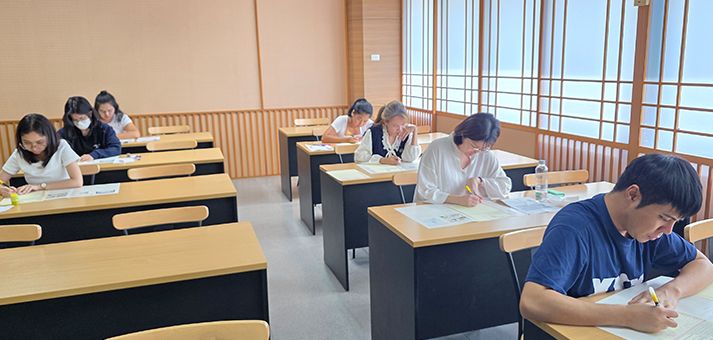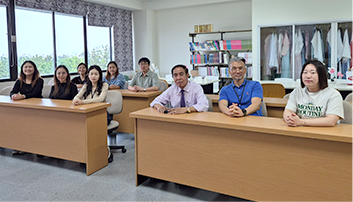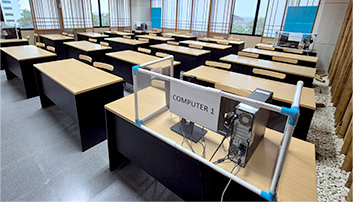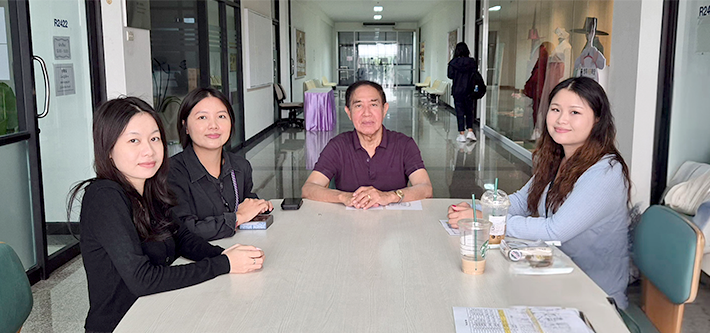

KSI Bangkok1, 8th Sejong Korean Language
Assessment (SKA) Administered
> Conducted in paper-based testing (PBT) format at Kasem Bundit University, Romklao Campus
> Successfully held despite strong earthquake tremors the day before
KSI Bangkok1 in Thailand administered the 8th Sejong Korean Language Assessment (SKA) over two days, from March 29 to 30, at the Romklao Campus of Kasem Bundit University. The SKA is a Korean language proficiency test organized by the King Sejong Institute Foundation (KSIF), an institution under the Ministry of Culture, Sports and Tourism dedicated to promoting the Korean language. The exam is open to learners of all levels, from beginner to advanced.
The SKA is designed to measure Korean language communication skills among KSI graduates and current or prospective KSI learners. Based on the National Institute of the Korean Language’s “Standard Curriculum for Korean Language Education,” the SKA consists of practical questions used in daily life and workplace contexts and evaluates all four language skills: listening, reading, writing, and speaking.
 KSI Bangkok1 instructors and staff conducting
KSI Bangkok1 instructors and staff conducting
pre-exam training for SKA proctors  Classroom where the SKA speaking test was administered
Classroom where the SKA speaking test was administered
This 8th SKA was conducted in the Paper-Based Test (PBT) format. Any Thai national studying Korean was eligible to apply, and a total of 31 individuals registered for the test. However, a 7.4 magnitude earthquake that originated in Myanmar the day before the test caused significant disruption in Thailand, including the suspension of public transportation services in Bangkok. Despite the turmoil, the assessment was carried out without issue, and all participants were able to complete the test safely.
Learners taking the 8th Sejong Korean Language Assessment (SKA) at KSI Bangkok1
The administration team at KSI Bangkok1 stated, “We have been administering the SKA since its first round, and it has improved each year, now being conducted in a much more stable and organized manner. We hope that more institutions around the world will adopt the SKA, and that it will eventually become as globally recognized as the Test of Proficiency in Korean (TOPIK) as a standard Korean language proficiency test.”
Thasita Auppid, a learner in Class 3A at KSI Bangkok1 who took the SKA for the first time, shared her thoughts by saying, “I took the 8th SKA because I wanted to assess my Korean language ability, and it was a very rewarding experience.” She added, “The SKA evaluates all four language skills—listening, speaking, reading, and writing—and provides a score-based proficiency rating instead of level-based certification. While it may feel challenging for beginner or intermediate learners, it gives a clear overview of what to study next and helps motivate continued learning.”
 Director and staff of KSI Bangkok1 who participated in administering the SKA
Director and staff of KSI Bangkok1 who participated in administering the SKA
Meanwhile, KSI Bangkok1, operated at Kasem Bundit University’s Romklao Campus, has administered the SKA a total of five times: in 2022 (1st round), 2023 (2nd round), 2024 (5th and 7th rounds), and now in 2025 (8th round). The 10th SKA is scheduled to be held on September 20. For detailed information on the annual SKA schedule, assessment criteria by level, test guidelines, and administrative regulations, please visit the official SKA website at ska.ksif.or.kr.
Article by Padtama Roongruangratanakul, Correspondent at KSI Bangkok1
